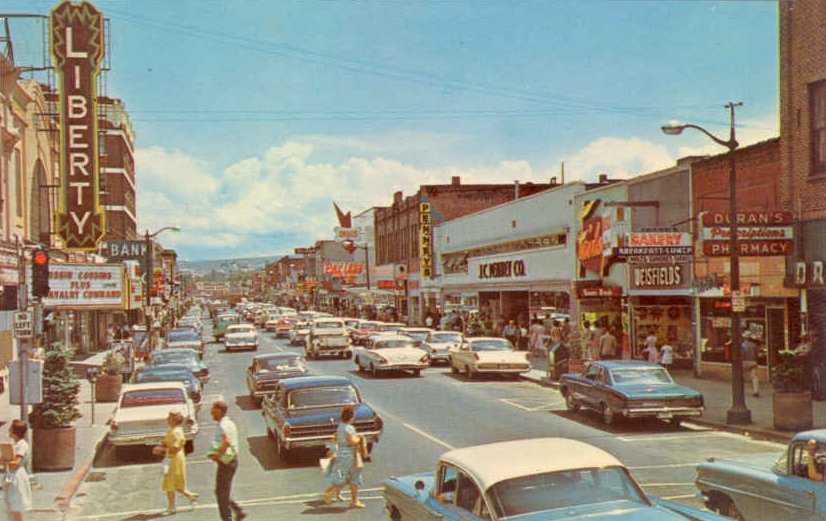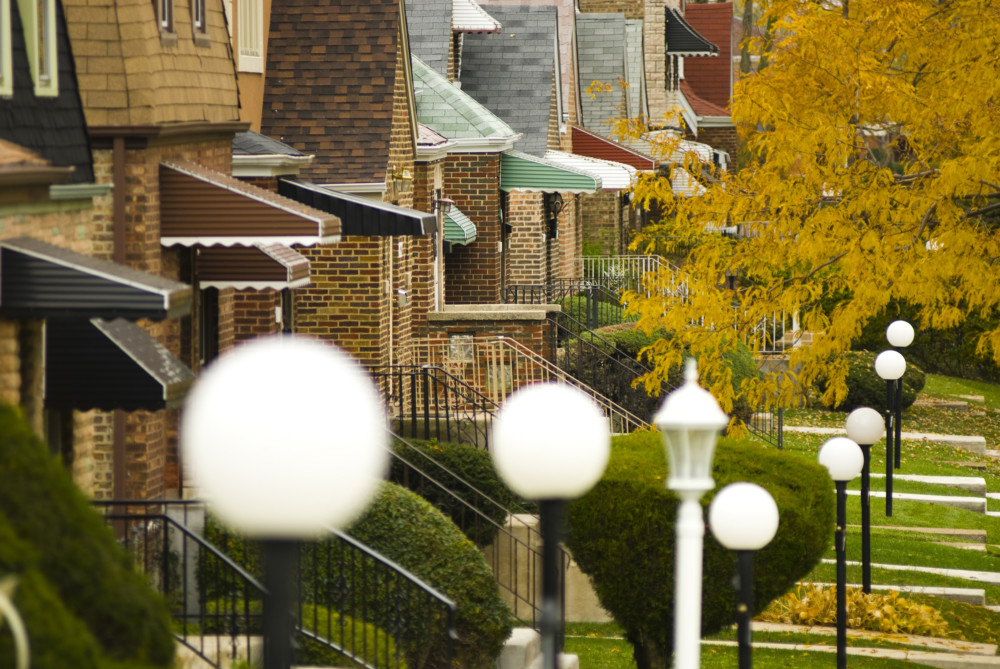By Elaine Williams
Lewiston Tribune, Idaho.
A contractor carried a gun when Nikky Hites and Vikky Ross renovated a former crack den at the base of Ninth Street in Lewiston.
The extreme measure was the only way the usually unflappable twins felt safe as squatters stopped by to pick up their belongings during the day and tried to steal fixtures at night.
It’s also an example of the lengths the Latah County residents are willing to go to save historic buildings with character, something they’ve learned to do and make a profit.
Their rescues include Morgans’ Alley, the Main Street building where the Blue Lantern Coffeehouse Lamp; Wine Bar is and a six-unit Normal Hill apartment complex. Blue Lantern’s location is officially called the Commercial Trust Building and was the office of the entrepreneur who constructed the Hurlbut Mansion in Lewiston as his residence.
Business Profile talked with Hites and Ross about what led them to buy properties in Lewiston, how they make their projects pencil out and where their business is headed.
Business Profile: How did you decide to go into commercial real estate?
Vikky Ross: When we were kids, we used to visit a relative in Albany, Ore., who had a big apartment building in a commercial area. We’d run down these big long hallways and then we’d go outside where she had a concrete fish pond. That made us want to own commercial property. Nothing was available in Moscow because that downtown had gone through this transition in the early ’80s when we were young, married, having kids and working part time.
Nikky Hites: We were also inspired by Ron and Julie Wells. They’re big commercial developers in Spokane. They bought the Brier Building in Lewiston. Mingles in Moscow was a condemned apartment building that was going to be torn down.
They bought it. I was hired to go in and clean up after the contractors. It was a full-time job. They do what we do at a much larger scale. Julie Wells pushed me. Once when they were fixing up the apartments, she said “I want you to wallpaper this hallway.” I said “I don’t know how to wallpaper.” She gave me a five-minute lesson and said “Nikky, there’s nothing you can’t do if you put your mind to it.” That has always stuck in my head. So it doesn’t scare us to buy these places. I saw what they did. Their buildings were in the same shape as ours.
BP: How do you divide the tasks on your projects?
VR: We do the carpentry and the maintenance. The practical experience we got doing construction work came from our dad and mom. Our dad was a carpenter. Our mom was right along side him doing the work so she learned a lot. We hire contractors for the electrical, plumbing, heating, cooling and ventilation systems.
BP: How did you find your first project?
VR: I was just driving down Main Street and I saw this huge real estate sign in the Commercial Trust Building on the weekend. Blackbird Java had closed. A skate shop was in the basement. The upstairs hadn’t been touched since 1940. It was all boarded over. When we walked in with a Realtor, it was just a mess.
NH: It was disgusting. It had been vandalized. There were pigeon droppings.
VR: We went, “This is exactly what we want.” We wanted something that was historical that had been abandoned, almost lived to the end of its life to where you almost didn’t think you could put life back into it.
NH: I had been remodeling mobile homes for 20 years. That’s why this didn’t deter us. I’ve had mobile homes where the floors were so rotted out you had to jump across the threshold to get inside. The roofs had leaked so bad the ceilings were laying on the floor. It’s like if we could fix those, this is just at a larger scale.
BP: What was your biggest concern?
NH: My fear was, “What if we can’t get tenants in it?”
VR: Buildings on both sides and across the street were boarded up. We could make this building beautiful, but who is going to rent this building if it has boarded up abandoned buildings all around it?
BP: How difficult was it to get tenants?
NH: When we got this one done, it was full of tenants.
BP: What were the numbers on the project?
NH: We purchased it for $85,000 and put $60,000 into it. We had $400 a month coming in from the skate shop.
VR: We always had income from our other businesses. This will be the year that we start getting income off our Lewiston properties. We’ve never taken a penny of income. It’s our equity to buy the next project, to do the renovations for the next project. We knew it would be a long-term investment with no income so we had to look at it as just self-sustaining. But the page has turned, we’re finally on Chapter 2.
BP: You just finished remodeling a single-family home in the last year. That’s a little different from your normal business model. What can you share about that?
VR: I was driving my father-in-law to chemotherapy at St. Joseph Regional Medical Center. I would walk while he was getting his treatments. I saw this beautifully dilapidated house that had washers and driers that filled the whole yard. It was overgrown with bushes. It had tarps nailed all over the roof. I couldn’t take my eyes off of it.
NH: We wanted to save it. We finally acquired it in January 2013 for $60,000.
VR: We replaced everything from the roof to the foundation. It has all brand new wiring, plumbing, a new gas furnace, heat pump for air conditioning, duct work, windows and insulation. We were able to salvage all the original woodwork, hardwood floors, doors. We sold it last year for $240,000. This was a brand new 2,400-square-foot house that was built in 1902 with a lot and a half and a double car garage with a shop bench in it. We’re hoping we can inspire other people to do that.
BP: You acquired the apartment house at the base of Ninth Street after it burned. What made you willing to take that on?
VR: We caught wind through the city that the house had been condemned and that the tenants had been evicted. This all was happening very quickly and the local bank had already sold it to a wholesaler who picks up these foreclosures in the Midwest. Once they sent an agent to look at it, they realized they had made a huge mistake. They were just looking at square footage and exterior pictures. That bank ordered a board up. One of the tenants had got back in there and caught that one apartment on fire. We took our contractor in. He said bone wise it’s got a lot stronger bones than the Normal Hill house. The roof and foundation were good. It was just tenant destruction. The squatters kept coming back even after we got it.
NH: They stole the heating system, all the radiators, the kitchens, the appliances. They left the toilets and the bathtubs.
VR: They don’t have tools. Whatever they can tear out with their hands and feet is what goes. They do have a little more strength when they’re high. We had to keep everything boarded up. Everything was screwed on with lots of screws because they don’t have screwdrivers.
NH: At the end of the day all the tools were removed from the site. The police did checks on us all the time.
VR: We returned possessions to squatters as much as we could. We didn’t want to take anything because everything that they own is in their minds irreplaceable, even if it was a few dishes.
BP: What were the numbers on that project?
NH: We paid $73,000. We sold it for $284,000 and made $50,000.
BP: Nikky you’ve battled cancer in the last year and your long-term contractor died. What impact have those personal challenges had on the business?
NH: I’m cancer free, but we need some time off.
VR: But if the right building came up, we wouldn’t rule it out altogether.















































































































































































































































































































































































